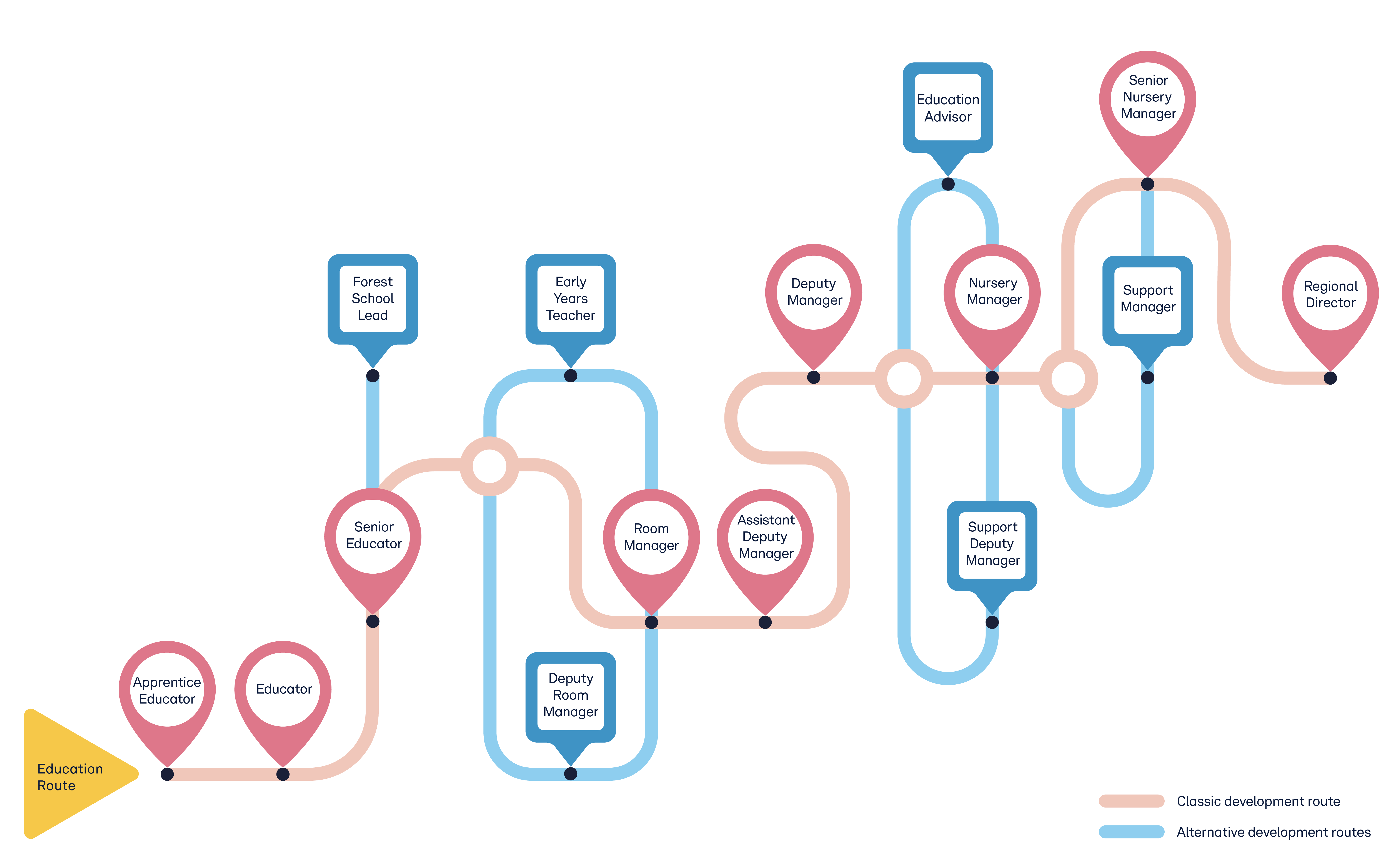
A career in Early Years teaching: What you need to know
Early Years teaching isn’t just a profession. Being in the position to purposefully shape young minds is a rewarding journey. If you are interested in helping children take their first steps toward learning and development, this could be an ideal career path for you. Whether you’re just beginning or looking to advance, this guide covers the essentials – from everyday responsibilities to qualifications and future career opportunities.
What is the role of an Early Years educator?
An Early Years educator works with children aged 0-5, providing support during their most critical and formative developmental stages. Their role focuses on creating enriching environments that promote emotional, social, and physical growth while encouraging curiosity and creativity in young learners. Despite the inevitable challenges that working with this age group brings, being an Early Years educator is a truly rewarding experience.
Core responsibilities
Some of the most relevant responsibilities of the Early Years educator are:
- Creating safe and supportive learning spaces where children feel secure and confident.
- Designing play-based activities that inspire exploration, learning, and fun.
- Observing and assessing progress to tailor the curriculum to individual needs.
- Communicating with parents, keeping them informed daily of their child’s growth and achievements.
- Collaborating with team members to maintain consistency and deliver high-quality education.
What is the Early Years educator’s salary?
The average salary for an Early Years teacher in the UK ranges between £27,000-£40,000 per year. While pay may vary depending on experience, location, and specific roles, this is the current standard for educators supporting children aged 0-5 in their developmental journey.
At N, we value our team members as individuals and provide necessary support for their personal and professional development. From industry-leading salaries to round-the-world trips, and life-long training and learning via the N Academy, we champion every dream at every stage of life. Explore more in our benefits and salary report.
Essential skills for success
To thrive in the Early Years teaching sector, you’ll need a combination of skills:
- Creativity: Crafting engaging, hands-on learning experiences that keep children inspired.
- Patience and resilience: Staying calm and attentive, even on busy days.
- Curriculum expertise: Creating engaging learning experiences that align with educational standards while fostering a love for discovery.
- Strong communication: Collaborating and building trusting relationships with children, parents, and team members.
- Office and educational software literacy: Basic proficiency in standard applications such as Famly or Tapestry.
- Empathy and emotional awareness: Supporting children’s behaviours and feelings with understanding and care.
- Adaptability: Flexibly responding to different learning styles and individual needs.
The routes to becoming an Early Years teacher
There are several routes to achieving Early Years Teacher Status (EYTS):
Degree route
- Typically entails a year of full-time study
- A government grant of £7000 available for covering course fees
- Offers bursaries up to £9000 for first-class degree holders, £4000 for 2:1 degree holders, and £2000 for 2:2 degree holders
Training route
- Enables training within a consortium of schools or nurseries
- Often leads to employment upon achieving Early Years teacher status
Graduate employment-based route
- A part-time one-year option tailored for graduates already working in Early Years settings
- Aimed at further training to meet the Teachers’ Standards (Early Years)
- Government funding of £14,000 available, covering course fees up to £7000
- Additional £7000 allocated as a contribution towards employer-incurred costs (i.e. supply cover or salary enhancement)
Undergraduates Pathway
- A 3-4 year route for students completing early childhood education degrees
- Tuition fee loans accessible through Student Finance England
Fast-track self-funded route
- Self-funded route spanning three months
- Suitable for experienced graduates working with children aged birth to 5 years
- Candidates must already meet the Teachers’ Standards (Early Years) with no further training required, such as overseas Early Years teachers
Can you become an Early Years teacher solely by experience?
While practical experience is invaluable in Early Years teaching, it is not enough on its own to meet the requirements for full qualification. However, the graduate-employment route offers a perfect balance, allowing you to gain hands-on experience while pursuing the academic credentials needed to achieve Early Years Teacher Status (EYTS).
This pathway is particularly beneficial for those already working in Early Years settings. Over the course of a year, you’ll receive training that aligns with the EYTS, enabling you to qualify without stepping away from your current role.
Relevant experience, such as volunteering at playgroups or classroom observations, can significantly strengthen your application. These experiences can be valuable additions to your CV, cover letter, and interviews. Sharing insights and observations gained during placements is a great way to show you are ready to create a nurturing, effective learning environment.
If you’re interested in an apprenticeship, our Nursery Apprenticeship programme at N is here to help you start or reignite your Early Years career.
Working hours
Given that you set your mind to embarking on the journey full-time, Early Years teachers generally commit to approximately 32 to 37 weekly hours in nurseries or preschools.
Although this workload may entail early mornings and late evenings to accommodate parents’ schedules, you will mostly adhere to an eight-hour workday. While shifts commonly span from 8 a.m. to 4 p.m., the nature of childcare services may require more varied hours, either starting the day earlier or finishing it later.
Need additional flexibility? At N, you can choose between our brand new 4-day, 36-hour week, the classic 5-day, 40-hour week, or perhaps doing something in between with our 36-hour +flexi-overtime offer.
Pros and cons of being an Early Years teacher
Being an Early Years teacher comes with its share of rewards and challenges. One of the biggest advantages is the opportunity to make a real difference – you play a vital role in supporting families and helping children thrive during their most formative years. Watching children hit developmental milestones and grow in confidence becomes one of the most rewarding parts of your day. Plus, no two days are ever the same, keeping your work exciting, fresh, and full of energy.
On the other hand, the role does come with its challenges. The hours can sometimes be unconventional, with occasional weekend work or adjustments to accommodate families’ schedules. Planning engaging lessons and activities can also require extra time outside of your regular working hours. However, these moments can also offer opportunities to engage with children in a more relaxed and rewarding way.
For a first-hand experience, read Rachel’s inspiring story of career redirection, from marketing to nursery educator at N.
What does career progression look like?
A career in Early Years teaching opens the door to plenty of opportunities for career growth and development. With a few years of experience, you might feel ready to step into a leadership role, such as a nursery manager, where you’ll oversee teams and help shape the learning environment for even more children.
Alternatively, you could explore further training opportunities as a nursery teacher or any other nursery role in London. These roles draw upon the foundational skills developed in Early Years teaching, emphasising the design and delivery of enriching activities that blend free play with educational objectives.
No matter where your path leads, Early Years teaching lays a strong foundation for a fulfilling and impactful career.
At N, we’re all about supporting you to hone your skills and take the next, exciting step in your journey. Take a look at the roles below and discover where you might fit into our world.
FAQ about Early Years teaching
What does an Early Years teacher do?
An Early Years teacher educates and nurtures young children to support their growth and development.
Who is an early childhood teacher?
An early childhood teacher is an educator who is dedicated to teaching and caring for young children.
What is the Early Years teacher diploma?
The Early Years Teacher Diploma is a qualification for educators working in this given field.
What is an Early Years educator qualification?
An Early Years Educator Qualification is a credential for individuals specialising in educating and nurturing young children, which can open many doors careerwise.

